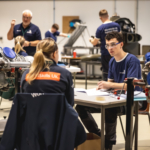Young women are demanding the right to a rewarding career – and fighting a surprising amount of young men that want them to remain at home, according to new research from WorldSkills UK.
63% of young women believe that a career is the way to achieve independence and 73% disagreed that men should earn money and a woman should look after the home and family.
However 24% of young men aged 16-19 said the opposite.
The new study for WorldSkills UK, prepared ahead of the opening of the UK’s largest skills, apprenticeship and careers event this week (The Skills Show, Birmingham NEC Nov 16-18) reveals most young people also feel supported and informed about careers choices – but value the opportunity for hands on experience.
Dr Neil Bentley, CEO of WorldSkills UK said:
“The results of this study reinforce the need for parents, educators and employers to work ever more closely together to support all young people make the choices which are right for them and meet the UK’s economic needs. Decisions made at this stage can have long-term consequences in terms of earning power and life chances.
“Young women seem to have the edge over young men in having the key skills employers value but need support to make informed choices, particularly about careers in tech, where young men are more confident. So where better for young people to assess all the options than at The Skills Show, where you can “have a go” at particular careers and talking directly to employers. ”
The research shows that gender stereotypes still exist in the 16-19-year-old age group, with both girls and boys feeling their gender can be a barrier to certain career paths – young women particularly so when it comes to STEM and tech careers.
The online survey of almost 2,000 16-19-year-olds and their parents, conducted by Opinium, provides a snapshot of how they are feeling as they approach decisions over choosing to go to college, university or apply for an apprenticeship.
Mums and teachers are the key influencers when it comes to working out what young people want to do and, while both girls and boys understand the importance of careers advice, they find the volume of information overwhelming and want to learn about potential jobs through hands-on experience.
Key findings of the research showed:
- A higher proportion of females than males think they are good at key skills highly valued by employers, like being organised (62% vs 42% respectively), self-motivated (53% vs 40% respectively), managing their time (51% vs 36% respectively) and communicating in writing (46% vs 29% respectively). On the other hand, males are more likely to be confident using technology than females (66% vs 58% respectively).
- 53% of young women identified a career as the best way to independence.
- Males (40%) are more likely to consider a technical and vocational education or career while females (23%) are twice as likely to consider being a teacher than males.
- Males are still generally more likely to opt for STEM related careers. For example, 21% would consider being an engineer compared to 7% of females.
- Between the ages of 16 and 18 mums/female guardians (59%) are the most likely source of careers advice.
- Almost all young people who took part in the survey (98%) say that figuring out what they want to do with their job is an important future goal and 73% feel positive about their career prospects.
- Parents of 16-19-year olds feel that careers advice has changed significantly. Two in three (65%) feel that careers advice now is based less on gender and more on ability. A similar number (63%) think that careers advice is better than when they were a child.
Up to 75,000 visitors are expected to visit The Skills Show. Among those attending will be members of the successful Team UK who picked up no less than 20 medals and medallions at WorldSkills Abu Dhabi 2017, known as the ‘Skills Olympics’. The UK is now tenth in the world rankings its performance at the competition.


